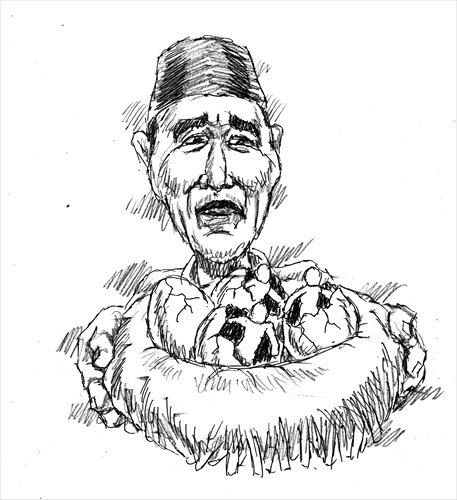HOME >> OP-ED
Indonesia’s new middle class remains fragile
By Ding Gang Source:Global Times Published: 2014-10-22 23:18:12

Illustration: Peter C. Espina/GT
Joko Widodo was sworn in as the new president of Indonesia Monday. This 53-year-old president, with strong grass-roots backing, is expected to bring hope for Indonesia's future reform. Widodo's inauguration may mark a new era of Indonesian politics that has long been dominated by military elite.
Widodo, the first Indonesian president not to come from the country's political or military elite, also tried to shape himself into a leader close to lower classes during his campaign. Lifting more people from poverty will be high on his agenda.
Nonetheless, due to the current development level of Indonesia, the main challenge facing the new government stems from not just poverty alleviation. It is no less challenging to protect Indonesia's fragile middle class from falling back into poverty.
Judging from the situation in many Asian and Latin American countries at similar development levels, it is very difficult to fully satisfy the demands of the middle class. And this is an important reason why these countries have long been stuck in the "middle income trap."
According to a report on the Indonesian market released by ANZ-Roy Morgan Research in early 2014, in the next decade, the number of consumers who spend between $2 to $10 a day will likely double and reach 150 million.
According to the criterion set by the Asian Development Bank, people with daily expenditures of between $2 and $20 belong to the global middle classes. This means more than half of Indonesian population will be technically ranked as middle class.
As a result, the Widodo administration will face two connected but different classes. One consists of the poor people, who will gradually move into the middle class in the next 10 years. The other consists of those who have already been lifted out of poverty and are already marching into the middle class.
Scholars refer to the latter as the fragile middle class. With daily expenditures between $2 and $20, they can only maintain a tenuous grip on their standard of living. This group is actually most vulnerable to economic downturns.
The first significant measure that the Widodo government has taken is to reduce fuel subsidies, moving the money elsewhere to boost reform such as improving education, expanding infrastructure and helping more than 28 million people get rid of poverty.
Each year, the Indonesian government appropriates more than $20 billion to compensate for fuel imports, which has become a heavy burden for the government. This year the subsidies exceed $21 billion, taking up 13 percent of government fiscal budget.
However, this reform is set to touch upon the interests of the existing middle class, especially those who have just started to enjoy the new living standards. They will bear the brunt once the oil prices go up. And the political energy of this group shouldn't be underestimated.
Democratic elections empower poor people, but they can also restrain a government's ability to act due to confrontations between different classes with different interest appeals. Given slowing economic growth and a widening wealth gap, it is even harder for different social classes to reach consensus.
In fact, many developing countries including Thailand and Brazil have witnessed divisions and confrontations between the poor and middle classes in recent years, which have led to suspension of their reform.
The middle class is the biggest group of taxpayers. They pay close attention to livelihood issues such as healthcare, education, and transportation, and they are also the group that are most sensitive to changes in public services. Last year, a million Brazilians demonstrated in the streets, protesting against bus fare increase of 10 cents.
For developing countries like Indonesia, it is not hard to implement poverty alleviation plans. What's difficult is to allow this massive group of people, who just walked out of the swamp of poverty, to continue their journey, rather than always lingering at the verge of the swamp.
The author is a senior editor with People's Daily. He is now stationed in Brazil. dinggang@globaltimes.com.cn. Follow him on Twitter at @dinggangchina
Posted in: Columnists, Viewpoint